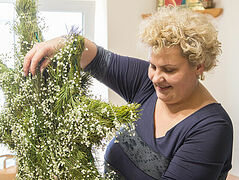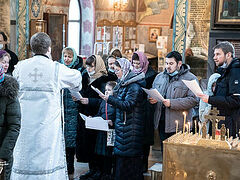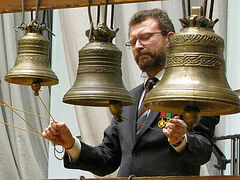Anyyone who has ever climbed a bell tower remembers the special childlike joy. It takes your breath away as you hear the rhythmic strikes of the main bell, and your heart rejoices at the festive peal. And you can’t help but marvel at how bell-ringers deftly manage their bells. Each bell-ringer has his own way of ringing and his unique “journey” to the bell tower.
The main thing is the desire to learn
“The bell is a special musical instrument designed to call people to pray. Bell-ringers call it the voice of God. Bell-ringing is a special kind of art,” Bishop Pachomy of Pokrovsk and Novouzensk1 says.
And every art needs to be learned. Vladyka himself often recalls how he first ended up on the bell tower of the Moscow Metochion of the Holy Trinity-St. Sergius Lavra. As is often the case in monasteries, it was his obedience: There was no one to ring during a great feast.
 The first experience in a stressful situation didn’t kill his desire to ring bells: the future archpastor made every effort to become a professional bell-ringer who loves his job and still rejoices at any opportunity to ring. But for those who want to learn how to ring he tries to create milder conditions in the Pokrovsk Diocese. The curriculum of the Pokrovsk Diocesan Educational Center includes applied courses, with “Bell-Ringer” among them.
The first experience in a stressful situation didn’t kill his desire to ring bells: the future archpastor made every effort to become a professional bell-ringer who loves his job and still rejoices at any opportunity to ring. But for those who want to learn how to ring he tries to create milder conditions in the Pokrovsk Diocese. The curriculum of the Pokrovsk Diocesan Educational Center includes applied courses, with “Bell-Ringer” among them.
The director of the courses, Priest Daniel Shcherbakov, has been active in the church since early childhood, and has rung bells since the age of ten. At that time, he would help a parish priest in the altar, climb the bell tower with his elders and learn to ring that way. And for six years now he has taught bell-ringing to a variety of people who are united by one thing—a great desire to learn this ancient art.
Men and women, children and adults enroll in this course.
“In terms of age, it is best to start from the age of ten or twelve, not earlier. Although on one occasion a six-year-old boy enrolled with his older brother. He even learned to ring on a small belfry. Of course, it is still too early for him to ring on the cathedral’s bell tower. But there are some advantages in such an early age—the younger the student, the easier it is for him to memorize and acquire skills. It is much easier to teach those aged between ten and twenty—their coordination and hand flexibility are better,” the priest explains.
What should you do if you want to learn how to ring, but you hesitate, don’t consider that you have an ear for music, and didn’t go to music school? Fr. Daniel answers this question simply:
“The bell is a musical instrument, but not as complex as the piano. The main thing is the rhythm, and almost everyone has a sense of it. In my practice, there has been only one person who did not have it. The main thing is the desire to learn.”
Develop a ringing style
The course is designed for several months—from October till Pascha.
“Now we simultaneously give our students theoretical knowledge and practical skills. Previously, at the beginning of the academic year, more emphasis was placed on theory, but then we realized that the knowledge received should be put into practice right away. So we are able to give more material, and it is easier to interest students. After all, children, in contrast to more assiduous and attentive adults, are not very good at memorizing theory, and they hurry to the bell tower,” Fr. Daniel relates.
 A logical question: How do residents of the surrounding houses endure the constant ringing outside service times? “We bought a training belfry especially for our students so they can practice ringing without annoying the neighbors,” Larisa Gennadievna Kurkanina, the Director of the Center, says. The belfry was installed in the basement, so the bell-ringers’ practical training does not bother anyone.
A logical question: How do residents of the surrounding houses endure the constant ringing outside service times? “We bought a training belfry especially for our students so they can practice ringing without annoying the neighbors,” Larisa Gennadievna Kurkanina, the Director of the Center, says. The belfry was installed in the basement, so the bell-ringers’ practical training does not bother anyone.
By February, Fr. Daniel assigns his students bell-ringing tasks; they perform this obedience at the Holy Trinity Cathedral of Pokrovsk (the former name of the city of Engels) in the Saratov region. And of course, they prepare for the final exam with might and main. What is the evaluation criterion that enables a teacher to accept his students for these exams? “Confidence. By the end of the academic year one’s ringing should be clear, plain and rhythmic, so he does not lose his rhythm even in the presence of a commission and spectators,” batiushka explains.
At the exam, which usually takes place during Bright Week, each graduate demonstrates his personal style.
“During the year I try to share my groundwork and recommend recordings of famous bell-ringers. And everything depends on the student’s diligence and talent—each tries to develop his own bell-ringing style. There are no two identical bell-ringers—each one has his own ringing and rhythm, albeit within the framework of a common tradition,” Fr. Daniel says.
The ringing tradition of the Holy Trinity-St. Sergius Lavra and the Moscow Novodevichy Convent are the closest to him. “But despite the fact that we are largely guided by the Lavra’s tradition, our Volga region’s tradition is still a little different.” And it cannot be otherwise. After all, bell-ringing is a creative work, and everything influences it. “At the same time, professionalism is important, which allows you to ring with high quality even if you are in low spirits or dejected by something,” batiushka emphasizes.
To learn to be useful
It is not easy to find church personnel today, and it can be hard to find a bell-ringer who could do this duty on weekdays. In our age of technological progress it would seem that a solution has already been found—the automatic bell control system—in other words, electronic bell-ringing. It does not require human participation (only to turn it on and off) and rings perfectly. What more could you ask?
“In most of our churches services are not celebrated daily. You need to search for a bell-ringer. Otherwise, electronic bell-ringers would force out all living bell-ringers. Neither the rector nor the parishioners will simply have an incentive to learn,” Fr. Daniel is convinced.
Batiushka considers this the most correct path—a person gets interested in the art of bell-ringing, approaches the church rector, shares his desire to ring, and then he (the rector) sends him for training. “I have such examples, and, as a rule, these people are very useful to their churches afterwards. It’s better than learning for yourself, just because you tried bell ringing and liked it.” He recalls Nikolai Maslov, a graduate this year and a parishioner of the Church of Great-Martyr George the Victorious in Pokrovsk (Engels). The rector, Priest John Eremenko, blessed him to undergo training; later a belfry was set up in the church under construction, and now Nikolai rings there. This fall he is entering a seminary. Just a couple of years ago, Peter Ulyanov finished his studies. He began as a parishioner of the Dormition Church, and now he has been ordained a deacon. Archpriest Roman Kozdrin from the Church of the Nativity of the Most Holy Theotokos sent his bell-ringer for training.
Of course, not everyone can carry an obedience in church—some are hindered by their work schedule, others by family duties. But it is all the more surprising when a person overcomes all obstacles and reaches his goal. It is even more amazing when school students become quite experienced bell-ringers. Ivan and Ilya Tikhonov and Kirill Prostitov no longer just ring during services. This summer they have more than once organized tours to the bell tower for their peers, telling them about the structure of the bell tower and demonstrating their personal styles. “He rings well. He should continue his training, and he will make a very good bell-ringer.” Such praise coming from a bishop is gratifying for an adult, and even more so for a ten-year-old boy.
Any obedience brings a person many benefits, and every church worker can confirm this.
“I began to understand the course of church services better. We discussed it during classes. A bell-ringer must understand what is happening in church in order to walk up the bell tower on time and ring as many times as needed,” Xenia Kaplun remarks.
She is always eager to climb the bell tower, and on Bright Week she is glad to do it several times a day. “She loves church life and strives to be useful,” Xenia’s teacher says about her.
“I listened to recordings of bell-ringing online—how Vladyka and Father Daniel ring—and I came up with my own style. We share our experience with bell-ringers. Sometimes several of us ring together and come up with a general pattern of ringing with different bells,” Xenia adds.
Bright Week can be called an “open day” at the bell tower. Both adults and children rush to ring bells. Deep in their hearts, bell-ringers worry—they are afraid for the cables, but they always arrange tours to the bell tower. What if someone comes to like to ring and the numbers of bell-ringers grow?
“Everyone who wants to learn how to ring should be given such an opportunity so he can rejoice and take part in this festivity. The ringing of bells in Russia is a special consolation—you hear it and it lifts your spirits even in difficult times. It is not without reason that during persecutions bell-ringing was prohibited, because without words—brightly and eloquently—it reminds you of God and the Church, and attunes you to prayer,” Bishop Pachomy is convinced.






